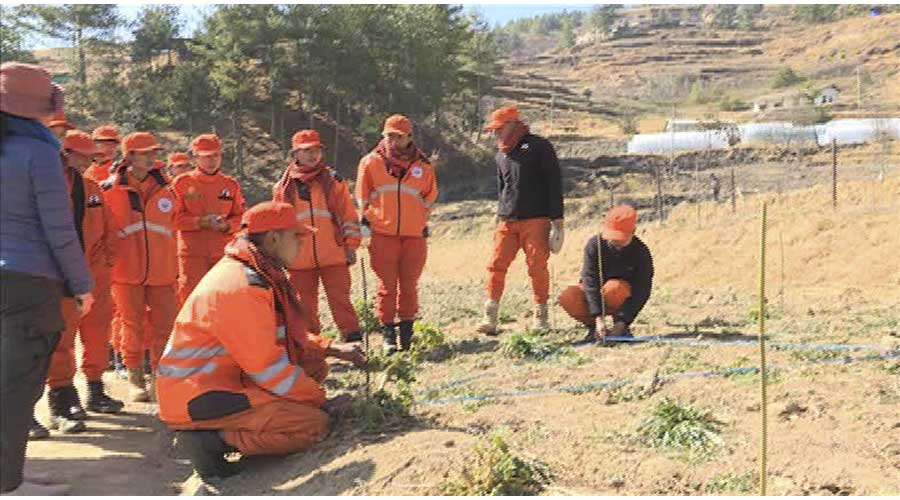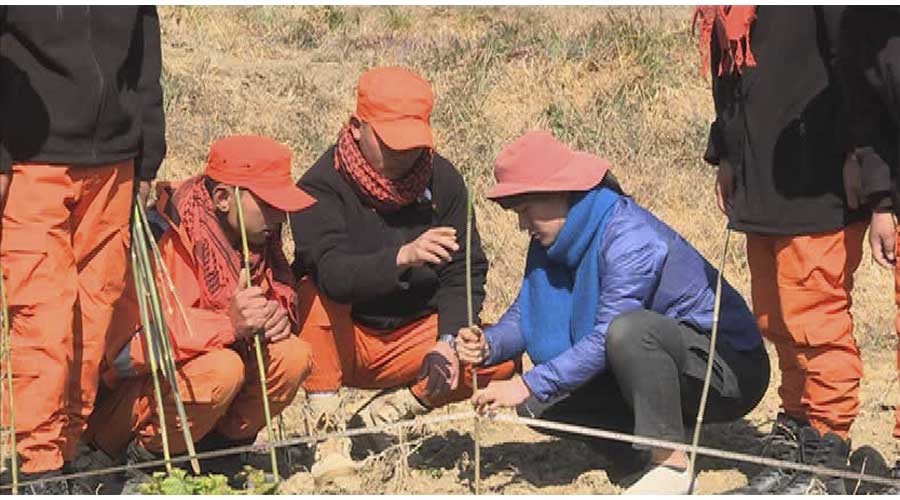
The second phase of the Million Fruit Tree Plantation Project is expected to see minimal failures. Around 175 DeSuups are being trained on the cultivation and management of the fruit trees to ensure that the project is a success. The Ministry of Agriculture and Livestock organized the five-day training in six Agriculture Research and Development centres across the country which ended yesterday. Around 30 per cent of the fruit trees reportedly died during the first phase of the project.
 In Thimphu, 30 DeSuup Gojays were trained at Yusipang National Centre for Organic Agriculture.
In Thimphu, 30 DeSuup Gojays were trained at Yusipang National Centre for Organic Agriculture.
They learnt techniques of pruning and grafting, orchard layout, pit digging, planting, and how to take care of the seedlings while distributing them to the farmers.
Pruning is a technique to improve the shape of fruit trees while fruiting and grafting are used to produce fruit seedlings that will ensure earlier and uniform fruiting.
Like-wise orchard layout is a method to ensure that the seedlings are planted in proper spacing according to the landscape, slope, and availability of land.
‘‘When we go to work in the villages I will teach my friends the process of plantation. I will also sensitize them about the production of trees and the benefits in the future,” said Sangay Norbu, Team Leader of Kawang Gewog in Thimphu.
According to the National Centre for Organic Agriculture Centre’s Horticulture officer, the spacing depends on the crops. For example, for fruits that have a bigger canopy at the bearing stage such as walnut and mango, the spacing is larger compared to other fruits like apples and peaches.
The officials recommend the size of the pits to be a metre deep, and one metre each in length and width respectively.
In addition, as fruit trees are perennial in nature, the officials said, it is important to provide adequate manure during plantation to enhance fertility, growth, and better quality fruits.
Similar training was organised for other DeSuup Gojays in Wangdue Phodrang, Monggar, Sarpang, Tsirang and Trashigang.
‘‘In the past, we carried out plantation unaware of the proper methods. As a result, some trees bore fruits and some didn’t. Until now, we haven’t understood the reason behind that. After the training, we understood what needs to be done in the initial stage of the plantation, including how to dig pits according to the size of the trees, and the amount of manure to use,’’ said Dechen Wangmo, Team Leader of Bongo Gewog in Chhukha.
The agriculture official said adequate irrigation should be provided for the proper growth of the trees as well as the development of fruits.
They recommend irrigation, especially at different stages of growth such as during flowering and fruiting stages and when the weather is too dry.
The project will be using a mobile app that will help to monitor the trees in the future.
‘‘We have also covered how to operate the mobile app that we are going to use to collect data on geocoding. The app that we are using is called as KoboCollect and we are using that in order to collect geographical information of the planted trees of the beneficiaries. Through this, we can find out where and how many trees have been planted in each and every part of the country,” said Ugyen Wangmo, Horticulture Officer from National Center for Organic Agriculture.
The trained DeSuups will further be training about two thousand other DeSuups.
The training is expected to ensure that every beneficiary has diverse nutritional fruits and provide them with an opportunity to earn income.
Karma Wangdi
Edited by Phub Gyem


